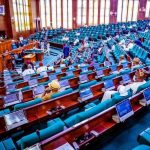The managing director/chief executive officer, MD/CEO of Financial Derivatives Company Limited, Bismarck Rewane, has said continuous borrowing from the Central Bank of Nigeria, CBN, by commercial banks is a major factor contributing to the pressure on the naira and inflation that has been witnessed in Nigeria for a long time.
According to Rewane, the pressure is to a greater extent because most of the borrowed funds are channelled into buying foreign exchange (FX) by the commercial banks.
While noting that the CBN has in the last three years raised interest rates 12 times, with five hikes and four adjustments to the symmetric corridor, the CEO stated that the CBN’s recent decision to adjust the asymmetric corridor around its Monetary Policy Rate would also significantly impact borrowing costs.
According to him, all the previous measures have had more substantial effects on liquidity than the 50 basis points increase in the MPR.
Recall that the CBN recently reviewed its window’s Monetary Policy Rate (MPR) to +500/-100 basis points after a two-day Monetary Policy Committee (MPC) meeting, which was also a sequel to a recent media report on Deposit Money Banks’ borrowing from the Central Bank in the first five days of July 2024, hitting an all-time high of N5.38 trillion.
Rewane also drew attention to the possible increase from 26 percent to 32 percent of borrowings by deposit money banks, representing an almost 5 to 6 percent difference that would henceforth be recorded as the cost of borrowing.
He said this was significantly high for the commercial banks borrowing from the CBN to buy FX, adding that the impact of the high costs had tendencies of translating into a significant reduction of the current pressure being faced by Nigeria’s currency, the Naira, and could make things easier for the people.
According to him, “there is a subtle and nuanced way of telling banks to stop robbing Peter to pay Paul,” as he stated that “banks go to the Central Bank, use the money there to buy FX and sell it to customers, essentially engaging in a form of carry trade.”
This, however, comes on the heels of the naira losing 3.13 percent of its value against the dollar on Tuesday, despite an increase in the greenback at the official foreign exchange (FX) market.
According to data from the FMDQ Securities Exchange, the dollar stood at N1,548.76 by the close of trade on Tuesday, while the Nigerian Foreign Exchange Market NAFEM disclosed that the rates stood at N1,500.32 on Monday.
Rewane also explained that the dollar supplied by willing sellers and willing buyers declined by 4.09 percent to $280.92 million on Tuesday from $269.88 million recorded on Monday, while the naira experienced a sharp decline, falling to 1,687 per dollar at the parallel market, popularly called the black market.
Previously, it had peaked at 1,915 a few months ago and then stabilised at around 1,500. However, this afternoon it dropped to 1,687. Uncertainty about the availability of reserves to support the currency is the cause of this decline.
Meanwhile, Rewane, while speaking on the impact of these changes, pointed out that between July 2021 and 2024, interest rates increased by 15.25 percent, while inflation rose by 16.81 percent. He suggested that the relationship between interest rates and inflation could lead to a better outcome with the recent adjustments.
He emphasised that when such adjustments are added, a better result will be seen, as the whole idea was aimed at effectively managing the country’s inflation.
Sources have also revealed that Nigeria’s headline Consumer Price Index (CPI) reached 34.19 percent, up from 33.95 percent in May, reflecting a 0.71 percent increase.
On a month-to-month basis, the headline inflation rate for June 2024 was a 2.31 percent increase, which is 0.17 percent higher than the 2.14 percent recorded in May 2024.
This is as the committee expects headline inflation to ease shortly due to the tight monetary policy environment and previous rate hikes, even though analysts at FBNQuest, while speaking on the implications, said Nigerian banks are likely to continue benefiting from the high interest rate environment, with widened net interest spreads resulting from repriced loans, adding that a shift of assets from equities to fixed-income securities is being expected in the equities market as investors seek higher yields from fixed-income investments.




